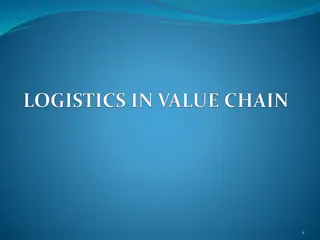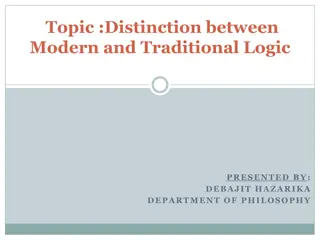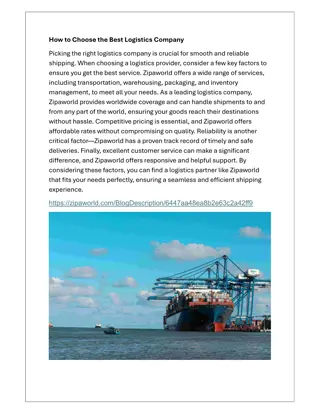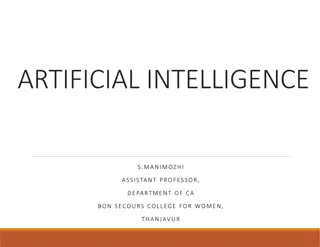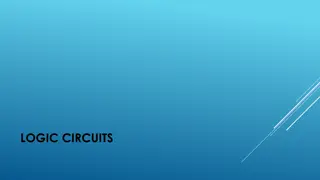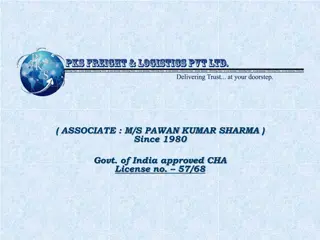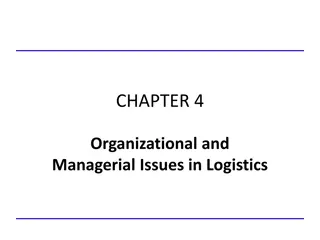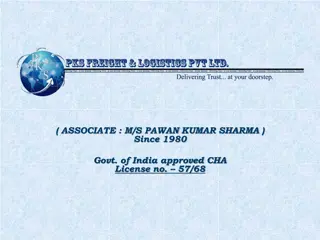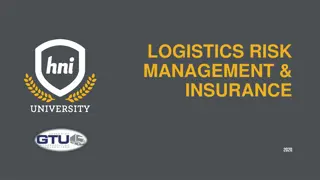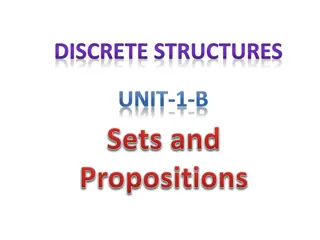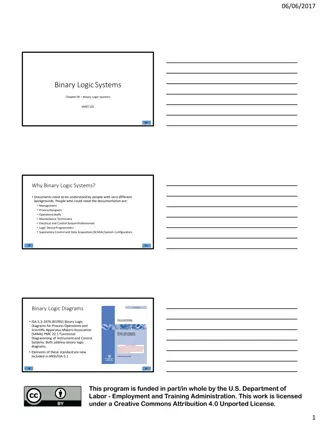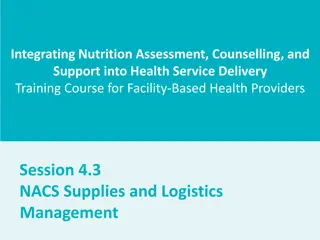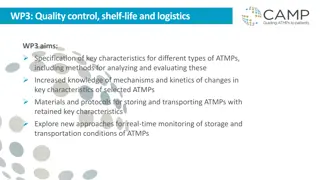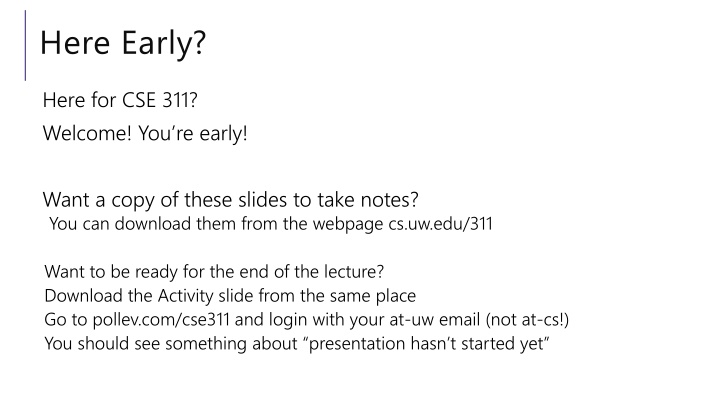
CSE 311: Foundations of Computing I - Course Logistics and Propositional Logic
Explore the foundational aspects of Computing with CSE 311 - Logistics, Propositional Logic, and more. Get ready for the lecture with downloadable slides and activities. Meet the staff and be prepared for section sessions starting soon. Stay updated with syllabus details and textbook readings. Enhance your learning experience by being an active participant in this exciting course.
Download Presentation

Please find below an Image/Link to download the presentation.
The content on the website is provided AS IS for your information and personal use only. It may not be sold, licensed, or shared on other websites without obtaining consent from the author. If you encounter any issues during the download, it is possible that the publisher has removed the file from their server.
You are allowed to download the files provided on this website for personal or commercial use, subject to the condition that they are used lawfully. All files are the property of their respective owners.
The content on the website is provided AS IS for your information and personal use only. It may not be sold, licensed, or shared on other websites without obtaining consent from the author.
E N D
Presentation Transcript
Here Early? Here for CSE 311? Welcome! You re early! Want a copy of these slides to take notes? You can download them from the webpage cs.uw.edu/311 Want to be ready for the end of the lecture? Download the Activity slide from the same place Go to pollev.com/cse311 and login with your at-uw email (not at-cs!) You should see something about presentation hasn t started yet
Logistics and Propositional Logic CSE 311: Foundations of Computing I Lecture 1
Outline Course logistics (e.g. how are we doing this online?) What is the goal of this course? Start of Propositional Logic
Zoom Logistics We ll always have a TA watching chat if you have a question, ask it there (either general or direct to the TA). Don t send direct to me, I won t see it TA may answer directly, interrupt me, or wait a few minutes and have me answer at a good stopping point. If you re comfortable (and have the wifi) to turn on your video please do Nodding/confused looks/glazed over eyes help me know if I said something super confusing. We will put recordings of (both) lectures on the course webpage.
Staff TAs Timothy Akintilo Austin Chan Yijie Deng Daniel Fuchs Raymond Guo Arthur Liang Melissa Lin Arthur Liang Andrey Ryabtsev Zoey Shi Josh Shin Alicia Stepin Jason Waataja Alice Wang Howard Xiao Instructor: Robbie Weber Ph.D. from UW CSE in theory First quarter as teaching faculty Third time as an instructor TAed 8 different courses. Office: CSE2 311 Email: rtweber2@cs.washington.edu
Sections Sections start tomorrow! Mostly a chance to practice and ask questions Please attend your registered section if you can. There can be multiple sections at the same time, make sure you know the two-letter code for your section. Zoom links on Canvas or Ed. Some sections introduce new material. TA walkthroughs will be posted for reference, but sections aren t recorded.
Syllabus It s all on the webpage: https://courses.cs.washington.edu/courses/cse311/20au/ In general, when in doubt, it s on the webpage. We ll talk through syllabus details as they become relevant, only a few highlights today
Textbook We ll have occasional pre- or post-lecture readings. All required readings will be available on the webpage. There is also an optional Discrete Mathematics and its Applications (Kenneth Rosen) We ll tell you the relevant sections for 6th or 7th editions. Many used copies available Good for practice with solved problems Older (or newer) editions also have necessary content, but it may be moved around. optional Book:
Work Homework (70%) Approximately weekly. Mostly due Fridays. Graded on both accuracy and clarity/style. Exams (22.5%) We ll have two take-home exams (think shorter homework rather than one-hour exam). Approximate dates: Nov. 13-16, Dec. 11-14 Lecture activities (7.5%) Completed either online live or (if you re asynchronous, or miss a lecture) online by the following Sunday.
Communication Ed Discussion board will be our primary means of communication. Please check frequently. You are also already be on the class email list Occasional announcements here. If you want to contact us: Private post on Ed (seen by staff, all TAs) Email Robbie Anonymous Feedback form on webpage
Pre-Quarter Survey There s a quiz up on canvas. Asking you questions like what time zone are you in? This will help us schedule office hours, connect people who might want study groups, etc. Please fill it out by tonight!
Collaboration Policy PLEASE collaborate! Please talk to each other and work with each other. (subject to the policy details on webpage) We re remote it s going to be harder to find people to work with. Ed posts to help find people Stay after section tomorrow Pre-course survey to help asynchronous people Let us know how we can help.
Form Study Groups! 311 is just a different course than intro programming. If programming came easy for you, 311 might not (and vice versa). Form a study group! "when people said form study groups they meant form study groups --Chloe Dolese Mandeville, CSE advisor
CSE 390Z CSE 390Z is a CSE 390Z is a workshop students enrolled concurrently in CSE 311. During each 1.5-hour workshop, students will reinforce concepts through: collaborative problem solving collaborative problem solving practice study skills and effective learning habits practice study skills and effective learning habits build community for peer support build community for peer support All students enrolled in CSE 311 are welcome to register for this class.If you are interested in receiving an add code, please fill out a form here. If you have any questions or concerns please contact Rob (minneker@uw.edu). workshop designed to provide academic support to
Were in a pandemic this just isn t normal. This probably isn t how you envisioned Your first quarter in CSE Your first quarter at UW This definitely isn t how I envisioned my first quarter as a professor We re going to do our best to support you If there s something you re missing that we can help with tell us!
What is this course? In this course, you will learn how to make and communicate rigorous and formal arguments. Why? Because you ll have to do technical communication in real life. If you become a PM you ll have to convert non-technical requirements from experts into clear, unambiguous statements of what is needed. If you become an engineer you ll have to justify to others exactly why your code works, and interpret precise requirements from your PM. If you become an academic to explain to other academics how your algorithms and ideas improve on everyone else s.
What is this course? In this course, you will learn how to make and communicate rigorous and formal arguments. Two verbs Make arguments what kind of reasoning is allowed and what kind of reasoning can lead to errors? Communicate arguments using one of the common languages of computer scientists (no one is going to use your code if you can t tell them what it does or convince them it s functional)
Course Outline Symbolic Logic (training wheels; lectures 1-8) Just make arguments in mechanical ways. -Using notation and rules a computer could understand. Understand the rules that are allowed, without worrying about pretty words. Set Theory/Arithmetic (bike in your backyard; lectures 9-20) Make arguments, and communicate them to humans Arguments about numbers and sets, objects you already know Models of computation (biking in your neighborhood; lectures 21-30) Still make and communicate rigorous arguments But now with objects you haven t used before. -A first taste of how we can argue rigorously about computers.
Some Perspective Computer Science and Engineering Theory Programming CSE 14x CSE 311 Hardware
What is symbolic logic and why do we need it? Symbolic Logic is a language, like English or Java, with its own words and rules for combining words into sentences (syntax) ways to assign meaning to words and sentences (semantics) Symbolic Logic will let us mechanically The new language will let us focus on the (sometimes familiar, sometimes unfamiliar) rules of logic. Once we have those rules down, we ll be able to apply them intuitively and won t need the symbolic representation as often but we ll still go back to it when things get complicated. mechanically simplify expressions and make arguments.
Propositions: building blocks of logic Proposition A statement that has a truth value (i.e. is true or false) and is well-formed Propositions are the basic building blocks in symbolic logic. Here are two propositions. All cats are mammals True, (and a proposition) All mammals are cats False, but is well-formed and has a truth value, so still a proposition.
Analogy In 142/143 you talked about a variable type that could be either true or false. You called it a Boolean Boolean variables are a useful analogy for propositions. They aren t identical, but they re very similar.
Are These Propositions? 2 + 2 = 5 This is a proposition. It s okay for propositions to be false. x + 2 = 5 Not a proposition. Doesn t have a fixed truth value Akjsdf! Not a proposition because it s gibberish. Who are you? This is a question which means it doesn t have a truth value. There is life on Mars. This is a proposition. We don t know if it s true or false, but we know it s one of them!
Propositions We need a way of talking about arbitraryideas To make statements easier to read we ll use propositional variables like ?,?,?,?, Lower-case letters are standard. Usually start with ? (for proposition), and avoid ?,?, because Truth Values: T for true (note capitalization) F for false
Analogy We said propositions were a lot like Booleans How did you connect Booleans in code? && || !
Logical Connectives And (&&) works exactly like it did in code. But with a different symbol Or (||) works exactly like it did in code. But with a different symbol Not (!)works exactly like it did in code. But with a different symbol
Some Truth Tables p q p q p p p q p q Truth tables are the simplest way to describe how logical connectives operate.
Some Truth Tables p q p q p p T T T T F T F F F T F T F F F F p q p q T T T T F T F T T F F F Truth tables are the simplest way to describe how logical connectives operate.
Implication Another way to connect propositions If ? then ?. If it is raining, then I have my umbrella. ? ? Think of an implication as a promise.
Implication p p q q p p q q The first two lines should match your intuition. T T T T F F The last two lines are called vacuous truth. For now, they re the definition. We ll explain why in a few lectures. F T T F F T This is the definition of implication. When you write if then in a piece of mathematical English, this is how you will be interpreted.
Implication (? ?) If it s raining, then I have my umbrella p p q q T F T T p p T T F F q q T F T F It s useful to think of implications as promises. An implication is false exactly when you can demonstrate demonstrate I m lying. It s raining It s not raining I have my umbrella I do not have my umbrella
Implication (? ?) If it s raining, then I have my umbrella p p q q T F T T p p T T F F q q T F T F It s useful to think of implications as promises. An implication is false exactly when you can demonstrate demonstrate I m lying. It s raining It s not raining No lie. True LIE! False I have my umbrella No lie. True I do not have my umbrella No lie. True
? ? ? ? and ? ? are different implications! If the sun is out, then we have class outside. If we have class outside, then the sun is out. Only the first is useful to you when you see the sun come out. Only the second is useful if you forgot your umbrella.
? ? p q T F T T Implication: p implies q whenever p is true q must be true if p then q q if p p is sufficient for q p only if q q is necessary for p p T T F F q T F T F Implications are super useful, so there are LOTS of translations. You ll learn these in detail in section.
A More Complicated Statement Robbie knows the Pythagorean Theorem if he is a mathematician and took geometry, and he is a mathematician or did not take geometry. Is this a proposition? We d like to understand what this proposition means. In particular, is it true?
A Compound Proposition Robbie knows the Pythagorean Theorem if he is a mathematician and took geometry, and he is a mathematician or did not take geometry. We d like to understand what this proposition means. First find the simplest (atomic) propositions atomic) propositions: ? Robbie knows the Pythagorean Theorem ? Robbie is a mathematician ? Robbie took geometry (? if (? and ?)) and (? or (not ?)) (? if (? ?)) (? ( ?))
A Compound Proposition Robbie knows the Pythagorean Theorem if he is a mathematician and took geometry, and he is a mathematician or did not take geometry. Robbie knows the Pythagorean Theorem Robbie is a mathematician Robbie took geometry ? ? ? (? if (? ?)) (? ( ?)) How did we know where to put the parentheses? Subtle English grammar choices (top-level parentheses are independent clauses). Context/which parsing will make more sense. Conventions A reading on this is coming soon!
Back to the Compound Proposition Robbie knows the Pythagorean Theorem if he is a mathematician and took geometry, and he is a mathematician or did not take geometry. Robbie knows the Pythagorean Theorem Robbie is a mathematician Robbie took geometry ? ? ? (? if (? ?)) (? ( ?)) What promise am I making? ((? ?) ?) (? ( ?)) The first one! Being a mathematician and taking geometry goes with the if knowing the Pythagorean Theorem is the consequence. (? (? ?)) (? ( ?))
Breakout Rooms We ll use breakout rooms to give you a chance to try problems with other students. Why? It works! https://www.pnas.org/content/111/23/8410 a meta-analysis of 225 studies. Just listening to me isn t as good for you as listening to me then trying problems on your own and with each other.
Breakout Rooms Every lecture we ll give you an activity to do in the breakout rooms. Directions are in Activity pdf Go to cs.uw.edu/311 and get that pdf!
Lecture 1 Activity Practice filling out a poll everywhere for Activity Credit! Introduce yourselves! If you can turn your video on, please do. If you can t, please unmute and say hi. If you can t do either, say hi in chat. Go to pollev.com/cse311 and login with your UW identity Or text cse311 to 22333 Choose someone to share screen, showing this pdf. Answer these get to know you questions until you re pulled back to the main room. What is your favorite socially-distanced activity? What class are you most excited about this quarter? And why is it 311? Found a new friend? A new study group? Share your emails!
Todo Tonight: Tonight: Pre-course survey on canvas. Make sure you can access the Ed discussion board Tomorrow: Tomorrow: Go to section Soon: Soon: Form a study group!

